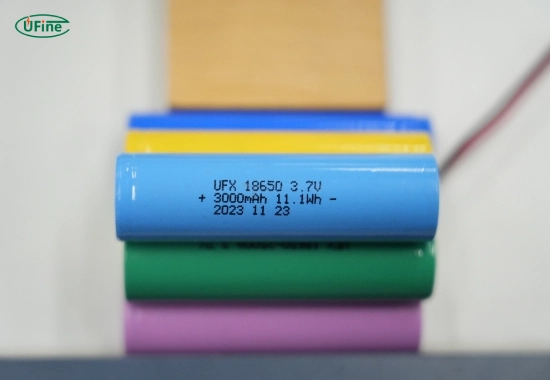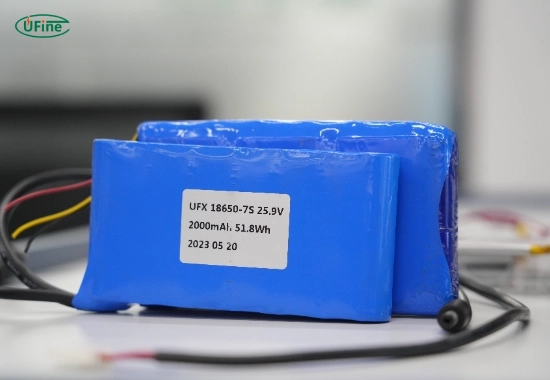Do you need to find reliable sources for 18650 batteries nearby ? This comprehensive guide is tailored to help you find the best local spots and online avenues to purchase 18650 batteries. Dive into the details of these batteries’ specifications, diverse applications, and crucial considerations when acquiring them. As the demand for these powerhouses grows, understanding their nuances becomes increasingly vital for consumers and enthusiasts alike.
Part 1. What is an 18650 battery ?
The 18650 battery, sized 18mm in diameter and 65mm in length, is a prominent rechargeable lithium-ion cell. Due to its exceptional energy density, its versatility spans diverse electronic devices like laptops, flashlights, and electric vehicles. Examining its internal components:cathodes, anodes, separators, and electrolytes. We offer insights into its performance and durability, crucial factors guiding purchase decisions. Now, where can I buy an 18650 battery near me?
Part 2. Buy 18650 batteries online
Advantages
- Convenience: Online platforms offer the convenience of browsing and purchasing from anywhere, eliminating the need for physical travel.
- Wide Selection: These platforms showcase various brands, capacities, and types, providing extensive choices for consumers.
- Price Comparison: Online vendors often feature competitive pricing, and users can easily compare prices across multiple websites.
- Reviews and Information: Detailed product descriptions, user reviews, and specifications empower buyers with information for informed decisions.
Disadvantages
- Shipping Time: While some offer fast shipping, others might have longer delivery times, which could be inconvenient for urgent needs.
- Quality Concerns: Physical inspection is necessary to ensure the authenticity and quality of the batteries received.
- Return Processes: Returning or exchanging items might involve shipping costs or complex return processes, adding hassle to the experience.
Part 3. 18650 Battery store
Advantages
- Personalized Experience: Visiting a physical store allows customers to receive customized advice, recommendations, and immediate assistance.
- Hands-on Inspection: Customers can physically examine products, assess quality, and inquire about technical details before purchasing.
- Specialized Services: Some stores offer battery testing or customization services catering to specific needs and preferences.
- Instant Availability: Immediate access to batteries can benefit urgent requirements, eliminating wait times for shipping.
Disadvantages
- Limited Selection: Physical stores might have a more restricted range than the vast online variety.
- Geographical Limitations: Availability might be constrained to the store’s location, making it inaccessible for some consumers.
- Possibly Higher Prices: Prices in physical stores could be higher due to overhead costs than online vendors.
Part 4. What to look for when buying 18650 batteries
18650 Battery Chemistry
Lithium Cobalt Oxide (LiCoO2)
- Advantages: High energy density, providing increased power output. It is commonly used in high-performance devices like laptops and smartphones.
- Disadvantages: Lower stability and safety compared to other chemistries. Prone to thermal runaway and reduced lifespan under stress.
Lithium Manganese Oxide (LiMn2O4)
- Advantages: Enhanced safety profile compared to LiCoO2.Less prone to thermal runaway, offering increased stability.
- Disadvantages: Slightly lower energy density compared to LiCoO2.Reduced capacity over numerous charge cycles.
Lithium Iron Phosphate (LiFePO4)
- Advantages: Superior stability and safety characteristics. It has an extended cycle life with consistent performance over multiple charge-discharge cycles.
- Disadvantages: Lower energy density compared to LiCoO2, affecting overall capacity. It is less suitable for high-power applications due to its lower power output.
Nickel Manganese Cobalt Oxide (NMC)
- Advantages: Balanced performance with moderate energy density and improved stability.Versatile for various applications, offering a compromise between power and capacity.
- Disadvantages: Higher manufacturing costs than other chemistries—limited lifespan under extreme conditions.
Lithium Nickel Manganese Cobalt Oxide (NMC or NCM)
- Advantages: Improved energy density compared to some other variants.Enhanced stability and capacity retention over charge cycles.
- Disadvantages: They may suffer from thermal instability under certain conditions.Higher manufacturing complexity, potentially increasing costs.
18650 Battery BMS
18650 Batteries with BMS
Advantages
- Overcharge Protection: BMS-equipped batteries prevent overcharging, extending the battery lifespan and enhancing safety.
- Over-Discharge Protection: BMS helps prevent excessive discharge, safeguarding the battery from damage and enhancing longevity.
- Balancing Cells: BMS ensures individual cells within the battery pack remain balanced, optimizing overall performance and capacity.
- Temperature Regulation: Some BMS systems regulate temperature, preventing overheating and improving safety.
Disadvantages
- Added Cost: Batteries with BMS tend to be slightly more expensive due to the added circuitry and components.
- Increased Weight and Size: The BMS components add weight and size to the battery, affecting portability in some applications.
- Complexity: More sophisticated BMS setups might require additional maintenance or monitoring, adding complexity.
18650 Batteries Without BMS
Advantages
- Lower Cost: Batteries without BMS are generally more affordable due to the absence of additional protective circuitry.
- Slightly Lighter: These batteries can be marginally lighter and more portable without the BMS components.
- Simplicity: Lack of BMS reduces complexity in usage, making it suitable for straightforward applications.
Disadvantages
- Lack of Protection: The absence of BMS exposes the battery to risks like overcharging, over-discharging, and cell imbalance, potentially reducing lifespan.
- Safety Concerns: These batteries might pose safety risks without protective measures, mainly if misused or in demanding conditions.
- Limited Performance Optimization: Lack of cell balancing and protective features might affect overall battery performance and lifespan.
18650 Battery Voltage
3.2V Batteries
Impact:
- Lower Voltage: These batteries have a lower nominal voltage, which might suit specific devices requiring lower power outputs.
- Compatibility: Devices designed for lower voltage requirements can benefit from 3.2V batteries without risking damage due to excessive voltage.
3.6V Batteries
Impact:
- Moderate Voltage: Batteries rated at 3.6V offer a reasonable voltage suitable for various applications, striking a balance between power output and compatibility.
- Versatility: Devices requiring a moderate voltage input often function optimally with 3.6V batteries, offering a good compromise between power and efficiency.
3.7V Batteries
Impact:
- Standard Voltage: Batteries rated at 3.7V represent a common voltage for many applications, widely used across various devices, including flashlights, laptops, and electronic devices.
- Compatibility: Most consumer electronics are designed to operate efficiently with 3.7V batteries due to their prevalent availability and compatibility.
Higher Voltage Batteries (Above 3.7V)
Impact:
- Increased Power Output: Batteries with higher voltage ratings offer increased power output, suitable for high-performance devices requiring more energy.
- Specialized Applications: Some technical devices, such as high-powered flashlights or electric vehicles, may require batteries with higher voltage ratings for optimal performance.
18650 Battery Capacity
Low Capacity Batteries
Impact:
- Limited Energy Storage: Batteries with lower capacities store less energy and might not sustain devices requiring extended usage or high power output.
- Suitable for Low-Power Devices: Devices with lower energy demands, like small flashlights or low-drain electronics, can function adequately with these batteries.
Moderate Capacity Batteries
Impact:
- Balanced Energy Storage: Batteries with moderate capacities strike a balance between energy storage and device compatibility.
- Versatile Usage: These batteries suit various devices, offering a reasonable compromise between capacity and portability.
High Capacity Batteries
Impact:
- Extended Energy Reserves: High-capacity batteries store more energy, which is beneficial for devices requiring prolonged usage or high power output.
- More Extended Device Operation: Devices such as high-powered flashlights, laptops, or electric vehicles benefit from these batteries due to their extended runtime.
18650 Battery Watt Hours
Low Watt-hour Batteries
Impact:
- Limited Energy Storage: Batteries with lower Watt-hour ratings store less energy, leading to shorter device runtime and reduced power output.
- Suitable for Low-Consumption Devices: These batteries are adequate for devices with minimal energy requirements, such as small electronics or low-power gadgets.
Moderate Watt-hour Batteries
Impact:
- Balanced Energy Capacity: Batteries with moderate Watt-hour ratings offer a reasonable compromise between energy storage and device compatibility.
- Versatility: These batteries can power various devices with average energy demands without compromising runtime or performance.
High Watt-hour Batteries
Impact:
- Extended Energy Reserves: High-watt-hour batteries store more energy, ensuring prolonged device runtime and supporting devices with high energy demands.
- Enhanced Device Operation: Devices requiring sustained power, such as high-performance laptops, drones, or electric vehicles, benefit from these batteries’ extended runtime.
Part 5. FAQs
-
Why can’t I buy an 18650 battery?
Availability might vary based on local regulations, stock availability, or supplier limitations. Check with various retailers or online stores specializing in electronic components. -
Can you use CR123 instead of 18650?
Generally, CR123 batteries have different sizes and voltages than 18650 batteries, and they may not be directly interchangeable due to differences in dimensions and power output. -
Is an 18650 battery the same as a 3 AAA?
No, they are different. A single 18650 battery has other specifications (size, voltage, and capacity) compared to three AAA batteries used together. -
How many times can an 18650 battery be recharged?
Good quality 18650 batteries can be recharged approximately 200-300 times. However, the exact number of charge cycles can vary based on usage, charging habits, and the battery’s quality. -
Why are 18650 so expensive?
Several factors contribute to the cost of 18650 batteries, including the quality of materials used, manufacturing processes, technological advancements, safety features, and demand, collectively influencing their pricing.
Related Tags:
More Articles

What Are the Different Series of LiFePO4 Batteries?
Understanding what different series of lifepo4 batteries can boost your projects. Check out our guide and pick the right cell for you! Learn more now.
Gravity Battery vs. Traditional Battery: A Comparative Analysis
Gravity batteries use gravitational energy for storage. This article compares them to traditional batteries, exploring mechanisms, advantages, and applications.
What Is a Gravity Battery?
A gravity battery stores electricity using gravitational energy. This article explores its mechanics, benefits, and real-world applications in renewable energy.
How to Choose the Right Battery Relay for Your Vehicle?
Choosing the right battery relay ensures optimal performance. This article explores key factors and answers common questions for selecting a reliable relay.
What to Know Before Buying a Riding Mower Battery
Ready to buy a riding mower battery? Learn the key factors to consider. Discover what you need to choose the best battery today!





